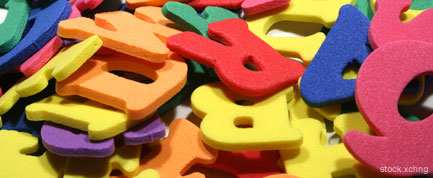Your Initials Could Spell Success

If your name begins with a "C" or a "D" you may not fare so well in school, but don’t think about changing your name to one beginning with an "A" or "B"—it won't boost your GPA.
This relationship between a person's initials and how well he or she performs in school was recently determined in a series of psychological studies examining how the so-called "name-letter effect" influences performance in different situations.
The effect was discovered in studies done in the 1980s in which people rated how much they liked each of the letters of the alphabet.
"Basically what [they] found was that people tend to favor the letters in their own name, and in particular, they have a fondness for their initials," said Joseph Simmons of Yale University, co-author of the new studies.
Self-liking
Simmons says this fondness for one's initials makes sense because people tend to like themselves and that "liking kind of works in the brain in an associative way, so if you like one thing, you like things that are associated with it."
The studies also showed that the effect seemed to influence people's life decisions.
Get the world’s most fascinating discoveries delivered straight to your inbox.
"People tend to gravitate toward life outcomes that resemble their names," Simmons explained. "So for example, we know now that people named Jack are more likely to move to Jacksonville as compared to people named Phil, who are more likely to move to Philadelphia."
People are also more likely to choose romantic partners with similar names (so Jack is more likely to marry Jackie) and to choose products that resemble their names, Simmons added.
What was unclear from the earlier studies, Simmons said, was whether this effect was conscious or not. Because the effect is small and not noticeable in everyday life, some proposed that perhaps there were just a few Jacks who loved their name so much that they purposely moved to Jacksonville, instead of doing so for some unconscious reason related to their name, but researchers thought this unlikely.
"They think that it's this sort of unconscious thing, you don't know why you like the thing you like," Simmons told LiveScience.
Strikeouts and grades
Simmons and colleague Leif Nelson reasoned that if the effect were unconscious, it would cause people to gravitate toward negative outcomes they would normally consciously avoid, for example, striking out in baseball or getting "C's" in school.
In baseball, strikeouts are recorded using the letter "K." Simmons and Nelson analyzed 93 years of Major League Baseball players' performances and found that batters whose names began with a "K" struck out slightly more often than batters whose names didn't.
In a separate study, Simmons and Nelson compared students' initials with their GPAs and found that students who had "C" or "D" as an initial had lower GPAs than students who had "A" or "B" as an initial.
People with "C" or "D" initials don't want to do badly, Simmons explained, but on some unconscious level doing poorly is "just ever so slightly not as bad, and so they're ever so slightly less motivated to avoid it."
The effect doesn't seem to work in the opposite way though. While those with "A" or "B" as initials may perform better than those who have "C" or "D" as initials, they don’t necessarily perform better than those whose initials don't match up to any letter grade at all, the studies found.
Simmons says this could be because "the people who have grade-irrelevant initials, like J, those people are already maximally motivated to succeed on some level. They all want to get A's and B's." And since getting an "A" is already a hard thing to do, the extra motivation an "A"-namer might have doesn't set them ahead if they are limited in their natural academic ability.
- Top 10 Mysteries of the Mind
- 10 Things You Didn't Know About You
- Life's Little Mysteries

Andrea Thompson is an associate editor at Scientific American, where she covers sustainability, energy and the environment. Prior to that, she was a senior writer covering climate science at Climate Central and a reporter and editor at Live Science, where she primarily covered Earth science and the environment. She holds a graduate degree in science health and environmental reporting from New York University, as well as a bachelor of science and and masters of science in atmospheric chemistry from the Georgia Institute of Technology.


